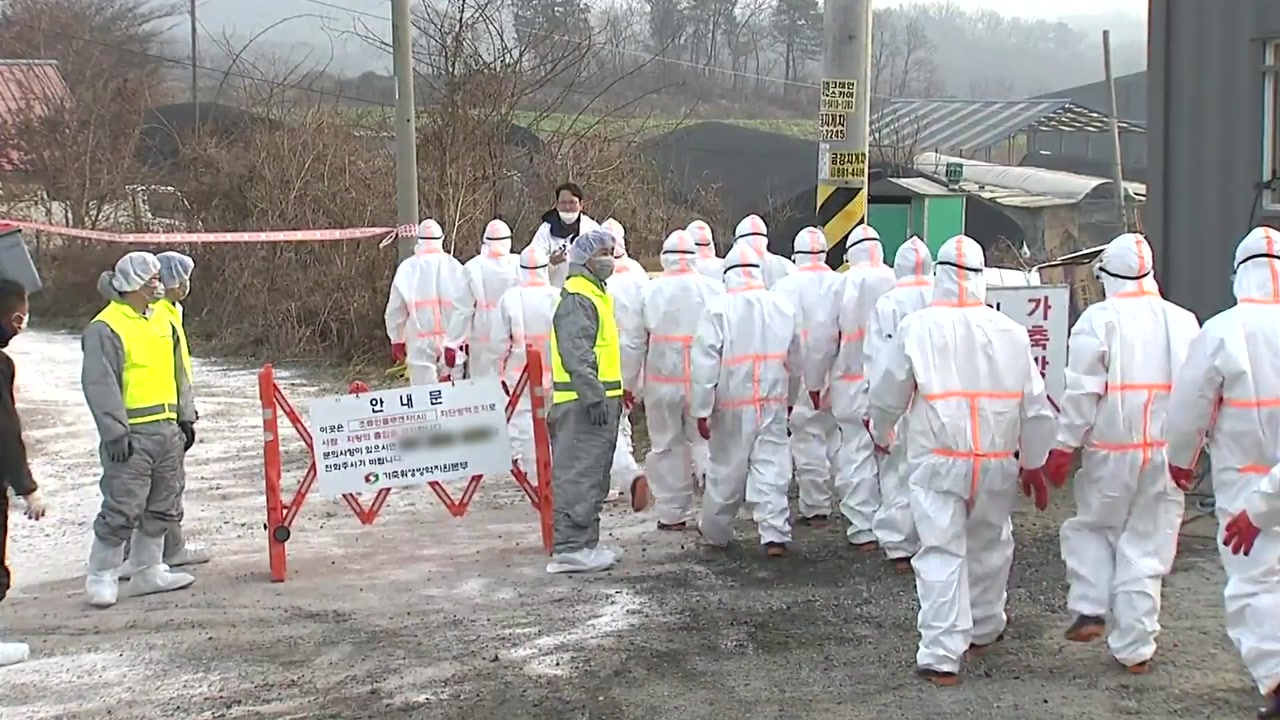
[ad_1]
Reports of suspected highly pathogenic avian influenza and AI have been reported at the laying hen farm in Yeoju, Gyeonggi-do, and authorities are conducting high pathogenicity tests.
As AI showed signs of spreading from Jeonbuk, Gyeongbuk, and Jeonnam to the metropolitan area, the quarantine took an emergency.
We will connect with reporters and share a detailed discussion. Reporter Cha Yoo-jung!
First of all, tell me the news from Yeoju, where you have reported suspicions.
[기자]Yesterday afternoon, an AI virus was detected in a laying hen farm in Yeoju, Gyeonggi-do.
About a thousand breeding chickens died at the same time, and the farmer reported AI, and a simple test came back positive for AI virus type H5.
The key is whether it is highly pathogenic.
This farm is located about 10 km from the Icheon Bok River, where highly pathogenic AI was recently confirmed in wild birds.
Quarantine authorities are currently under review and the results will be released later tonight.
This farmhouse had 190,000 chickens.
As a precautionary measure, the authorities have decided to bury chickens from the farm and more than 7,000 ducks from a duck farm within a three kilometer radius.
[앵커]If highly pathogenic AI is confirmed in Yeoju, it will be the fourth outbreak only in poultry farms this year, right?
[기자]On the 26th of last month, a highly pathogenic AI was confirmed for the first time this year at a meat duck farm in Jeongeup, Jeollabuk-do.
Within five days, a highly pathogenic AI was detected in a laying hen farm in Sangju, Gyeongbuk.
Yesterday, a highly pathogenic AI occurred at a duck farm in Yeongam, Jeollanam-do.
Although its high pathogenicity is still being tested, if Yeoju is confirmed, it will be the fourth outbreak this winter and avian influenza will spread to the metropolitan area, putting the country at a very high risk of infection.
[앵커]What’s the reason AI is spreading so quickly this winter?
[기자]The main culprit for AI infection is wild migratory birds.
Among winter migratory birds, not a few have flown from Siberia and other places infected with AI.
Once again, about a month before AI was generated in poultry farms, highly pathogenic AI was already detected dozens of times in wild birds.
This outbreak has lasted for around 2 years and 8 months since the beginning of 2018.
Although highly pathogenic AI has not been released from migratory birds in the last two years, detection of toxic AI has been followed.
The path of infection to farms is that migratory bird feces from wild bird habitats or small rivers flow into surrounding poultry farms.
It is mainly transmitted to farmers by smearing human feet, feeding tea, and equipment.
At the Jeongeup, Jeollabuk-do and Sangju farms, Gyeongbuk, where highly pathogenic AI was previously detected, small rivers and reservoirs were found nearby, and quarantine authorities are conducting an epidemiological investigation of the exact route of entry.
[앵커]What are the actions of the current quarantine authorities?
[기자]I told you earlier that the spread of AI is transmitted by food vehicles, etc.
The key measure is movement control.
The authorities ordered a temporary suspension of the movement of poultry farms, livestock facilities and livestock vehicles in Gyeonggi-do.
The period of temporary suspension is 48 hours from 5 am on the 7th to 5 am on the 9th.
The quarantine authorities organized a central inspection team during the temporary suspension period to verify if the order was carried out.
The policy is to disinfect poultry farms, livestock facilities and vehicles, and migratory birds at the same time.
Violation of the temporary suspension order may result in a sentence of up to one year in prison or a fine of up to 10 million won according to section 57 of the Infectious Animal Disease Prevention Act.
[앵커]Lastly, it appears that the social and economic damages will not be easy when AI spreads.
[기자]Once the presence of highly pathogenic avian influenza on a farm is confirmed, preventive burial of chickens and ducks from poultry farms within 3 km of the outbreak farm is initiated.
In 2016, which was dubbed the worst AI crisis, 383 cases of AI were reported in domestic poultry farms, and at that time more than 37 million chickens and ducks were buried in 950 poultry farms.
As such, the damage to poultry farms is enormous and the price rises due to unstable supply and demand for chicken and eggs, causing damage to related industries and consumers.
Fortunately, the aftermath isn’t that great so far, but the future is a problem.
As the domestic influx of migratory birds continues through February next year, quarantine authorities are calling for awareness of the dangers in areas where AI is detected on poultry farms, as well as in Gangwon, Chungnam and Jeju, where it has occurred. AI from wild birds, and to raise awareness among farmers. I asked.
So far, the Ministry of Economy has delivered it.